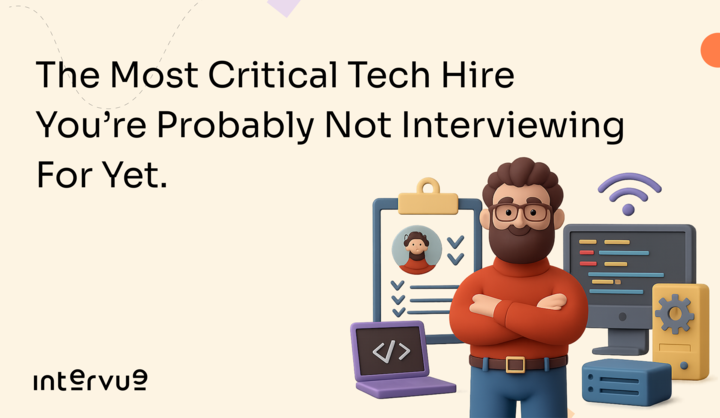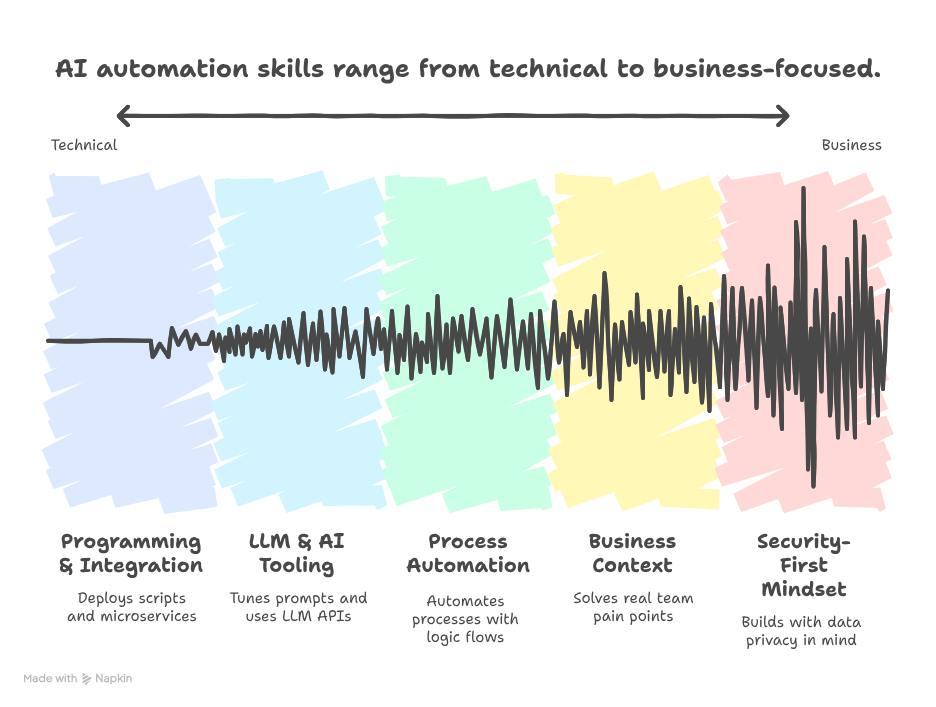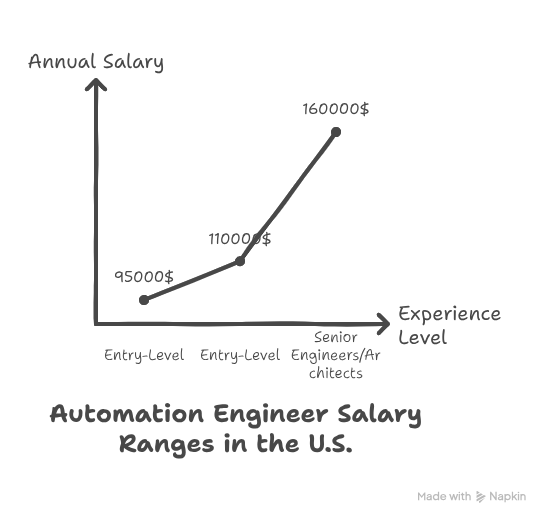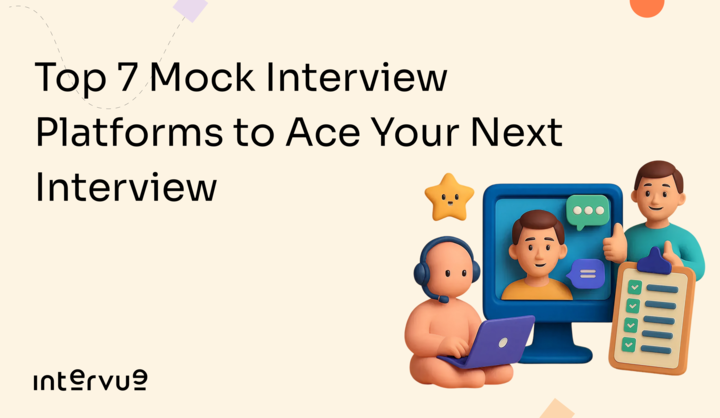The Most Critical Tech Hire You’re Probably Not Interviewing For Yet
This emerging title may not yet appear in every job board or HRIS system, but forward-looking companies, especially those in fintech, SaaS, and digital services, are starting to bring them on board.

Over the last 18 months, the corporate world has undergone a significant transformation. From customer support chatbots to auto-generated reports and intelligent onboarding flows, generative AI has gone from futuristic to foundational. Yet while companies are eagerly adopting LLM-based tools, few have hired the talent needed to make these systems work at scale.
The most overlooked role in this AI-led evolution? The AI Automation Engineer.
Thinking about jumping into AI? You're not alone. Whether you’re mapping out your AI engineer roadmap, eyeing those cool generative AI jobs, or just curious about what an automation engineer salary looks like these days, it’s a great time to get into the game. The demand for every kind of AI specialist is exploding, and the roles are only getting more exciting.
This emerging title may not yet appear in every job board or HRIS system, but forward-looking companies, especially those in fintech, SaaS, and digital services, are starting to bring them on board. They’re the builders who transform GPT experiments into production-grade workflows. Without them, AI adoption becomes fragmented, risky, and short-lived.
What Is an AI Automation Engineer and Why the Role Matters
An AI Automation Engineer is a cross-functional specialist who combines software engineering, process automation, and AI integration to drive scalable, intelligent systems across departments.
They aren’t just programmers. They’re orchestrators connecting APIs, training lightweight models, fine-tuning prompts, deploying agents, and automating repetitive workflows that eat up human time. They understand business logic and can embed AI into real-world processes.
At a high-growth company, an AI Automation Engineer might:
- Deploy an OpenAI-powered co-pilot in HR to streamline candidate screening
- Build an LLM-based classification model to auto-triage support tickets
- Create no-code/low-code automations using tools like Zapier or n8n for lead enrichment
- Integrate AI document parsing with finance reconciliation workflows
- Build internal Slack agents to summarize and route sales data in real-time
The result? Reduced manual effort, better data quality, and dramatically faster turnaround times.
Why AI Automation Engineers Are Critical to Business Success
While AI hype is everywhere, execution is still the missing link. That’s not because the tools don’t work; it’s because AI alone doesn’t deliver ROI. The key variable is people.
AI Automation Engineers serve as the connective tissue between business strategy and technical delivery. They turn vague ideas like “let’s automate onboarding” into secure, measurable, and iterative systems.
They’re also critical to ensuring that:
- Workflows are explainable and auditable (especially in regulated industries)
- Models are selected appropriately (open-source vs proprietary)
- Prompts and agents are updated continuously as the business evolves
- Human-in-the-loop (HITL) design is baked into workflows to avoid hallucinations
Without someone in this role, most AI initiatives get stuck in pilot purgatory or balloon into risky, shadow-IT projects. With them, companies build a repeatable engine for intelligent automation.
Core Skills Required for AI Automation Engineering Roles
Since this is a hybrid role, successful AI Automation Engineers need both technical depth and systems thinking. They won’t always have “AI” in their previous job titles, many come from backgrounds like full-stack engineering, DevOps, business automation, or even data engineering.
Here are the key skills that define top performers in this space:
1. Strong Programming and Integration Skills
Proficiency in Python or JavaScript is table stakes. They must be able to work with REST APIs, SDKs, and CLI tools. Understanding how to build, deploy, and monitor scripts and microservices is crucial, especially in cloud environments like AWS or GCP.
2. AI/LLM Implementation Experience
While they don’t need to be deep learning experts, they should know how to fine-tune prompts, use vector databases like Pinecone or Weaviate, and integrate LLMs via APIs (e.g., OpenAI, Anthropic, Mistral). Familiarity with LangChain or LlamaIndex is a big plus.

3. Process Automation Expertise
Experience with tools like Zapier, Make, n8n, or Robocorp helps them accelerate delivery without always writing code from scratch. They should also understand business logic, decision trees, and workflow orchestration.
4. Business and Domain Context
Whether it’s finance, HR, legal, or support, great automation engineers understand the pain points of internal teams. They ask the right questions to scope use cases that matter and avoid automating for automation’s sake.
5. Security and Governance Awareness
From GDPR to SOC 2, security is a critical layer. AI automation must include role-based access, usage logging, version control, and data anonymization where needed. A solid AI Automation Engineer builds with compliance in mind.
How to Structure Your Hiring Process for AI Automation Engineers
Most companies make the mistake of hiring for this role like they would for a backend dev or ML engineer. That’s a recipe for mismatched expectations. Instead, build a hiring pipeline specifically tuned to this role’s unique blend of technical, AI, and business context.
Here’s how leading companies are structuring their process:
Step 1: Start With a Role-Specific JD
Use clear language that reflects the hybrid nature of the role. Avoid catch-all phrases like “AI ninja.” Instead, focus on real responsibilities:
- Designing and deploying LLM-powered process automations
- Building secure integrations with internal business systems
- Managing prompt frameworks and AI agent behavior
- Collaborating with business stakeholders on use case discovery
Step 2: Screen for Systems Thinking
Use initial calls to test how candidates think through business workflows. Can they identify bottlenecks in a manual process? Do they ask the right clarifying questions? The best candidates are curious generalists with a builder’s mindset.
Step 3: Use Real-World Technical Assessments
Instead of Leetcode or Kaggle competitions, give them a take-home challenge like: “Build an automation that ingests customer feedback emails, classifies them, and sends summaries to Slack.”
You’ll see how they use tools, structure logic, and handle edge cases, exactly what they’d do on the job.
Step 4: Include an AI Prompting or Agent Design Round
Ask them to structure prompts or workflows for a given use case (e.g., contract summarization). Look for their ability to control LLM output, use temperature effectively, or decide when to use embeddings or search.
Step 5: Align on Ownership and Delivery Mindset
This is not a narrow dev role. It requires cross-team collaboration, fast iterations, and self-direction. Candidates should be comfortable owning the end-to-end lifecycle from discovery to monitoring.
What’s the Deal with Automation Engineer Salary in 2025?
Let’s talk numbers. The automation engineer salary has jumped significantly in the past 18 months. In the U.S., entry-level roles are starting at $95,000–$110,000 annually, while senior engineers and architects easily cross the $160K mark—with added bonuses and stock options.

Companies in BFSI and enterprise SaaS are particularly aggressive in hiring, especially if you’ve got experience working with RPA tools, AI agents, or automation platforms that reduce operational costs.
Real-Life Success Stories of AI Automation Engineers in Action
The AI Automation Engineer isn’t just a theoretical role. Across industries and geographies, these professionals are already driving measurable impact. Here are real-life examples of how forward-thinking companies, including some from Intervue.io’s client base, have embraced this role and transformed their operations.
Muthoot Finance: Loan Approval Automation at Scale
Muthoot Finance implemented a rules-based and human-in-the-loop AI automation system to streamline loan approvals. This deployment included:
- Integration with core banking systems (CBS)
- Logging and audit trail generation
- Maintaining compliance with RBI guidelines
Outcomes (annual):
- 5.46 lakh hours saved i.e., about 546,000 man-hours
- Reduction of average handling time from 10–15 minutes to 1–2 minutes per transaction
- Zero execution errors after automation rollout
- Full traceability and strict policy alignment ensured compliance
Nykaa: Streamlining Customer Support with AI-First Ticket Triage
As India’s top beauty e-commerce brand, Nykaa receives thousands of support tickets daily ranging from delivery delays to refund requests. The support team was struggling to maintain SLAs during high-demand periods like Diwali and sales campaigns.
Nykaa partnered with Verloop.io, a conversational AI platform, to automate a portion of its customer support in 2021. Key details from a verified case study include:
- Before automation, support agents spent over 32,000 staff hours per month answering queries.
- Within the first 30 days of deployment, Nykaa handled 1.6 million unique conversations via Verloop.io chatbots.
- The bots were configured to resolve repetitive requests like cancellations, refunds, replacements, and shipping inquiries.
- Over 90% of customers rated these automated interactions as “highly favorable” or “excellent.”
Finally,
In a world where AI is eating the workflows of yesterday, the companies that win won’t just be the ones with access to the best tools; they’ll be the ones who hire the talent that knows how to use them effectively.
AI Automation Engineers are the force multipliers of the modern workforce. They don’t just build smarter systems; they reshape how teams operate. As more departments become AI-integrated, the demand for these hybrid builders will only grow.
Yet today, most companies haven’t even begun interviewing for this role.
If you’re serious about building AI-first operations, start now. Define the role. Calibrate your hiring process. And find the people who can unlock the next frontier of productivity, not with hype, but with hands-on, reliable execution.
Need help designing structured hiring processes for emerging tech roles like AI Automation Engineers?
At Intervue.io, we help companies run calibrated technical interviews using real-world scenarios, AI-ready rubrics, and expert panels, so you can confidently assess modern tech talent, even in hybrid roles like this.



